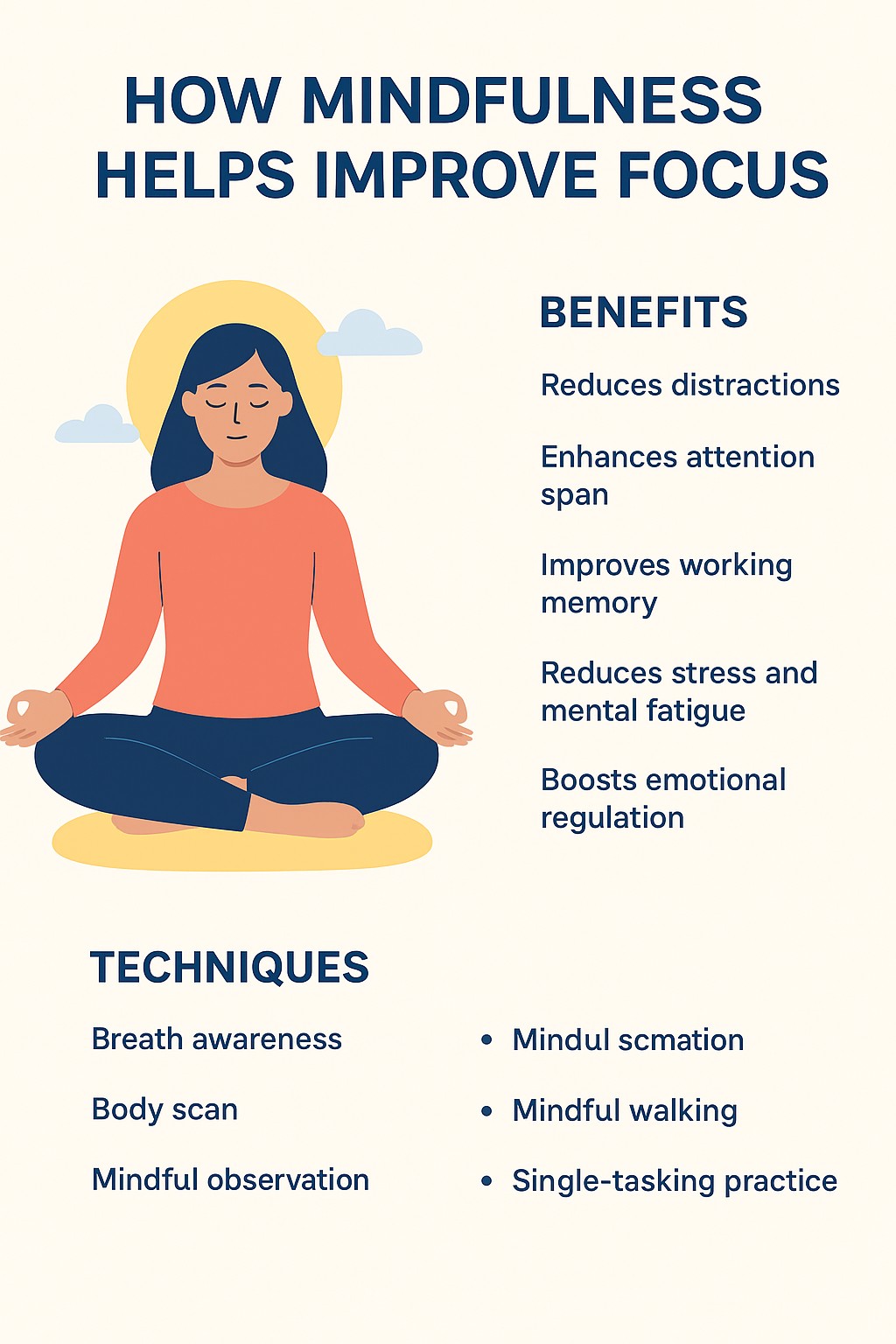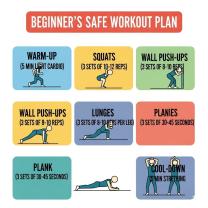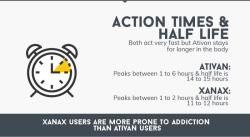Can "mindfulness" help you focus?
Yes — mindfulness can significantly help improve focus. Mindfulness is the practice of paying attention to the present moment in a non-judgmental way, and research shows it enhances attention, concentration, and mental clarity.
Here’s a detailed overview:
1. How Mindfulness Improves Focus
Reduces Distractions: Training your mind to notice when it wanders and gently bring it back improves sustained attention.
Enhances Working Memory: Mindfulness exercises strengthen the ability to hold and manipulate information mentally.
Improves Cognitive Control: Helps manage impulsive thoughts and prioritize tasks effectively.
Reduces Stress: Lower stress levels improve clarity and reduce mental fatigue, allowing for better concentration.
2. Key Benefits of Mindfulness for Focus
| Benefit | Explanation |
|---|---|
| Better Attention Control | Maintains focus on one task, reduces mind-wandering |
| Increased Mental Clarity | Clearer thinking and decision-making |
| Reduced Cognitive Fatigue | Sustains energy for longer periods of work or study |
| Emotional Regulation | Minimizes frustration or anxiety that disrupts focus |
| Enhanced Task Performance | Greater accuracy and productivity in tasks |
3. Mindfulness Techniques to Boost Focus
Mindful Breathing
Focus on your breath for 2–5 minutes, noticing inhalation and exhalation.
Body Scan
Slowly bring attention to different parts of your body, noticing sensations without judgment.
Mindful Observation
Pick an object and observe it in detail, engaging all senses.
Guided Meditation
Use apps or recordings that lead you through focused meditation sessions.
Mindful Walking or Movement
Pay attention to each step, your posture, and surroundings while walking.
Tip: Start with short daily sessions (5–10 minutes) and gradually increase. Consistency is key for long-term improvements in focus.
What Is Mindfulness and How It Affects Focus
Mindfulness is the practice of intentionally bringing one's attention to the present moment, without judgment, to the unfolding of experience moment by moment. It involves observing thoughts, feelings, bodily sensations, and the surrounding environment with a sense of curiosity and acceptance. It's not about emptying your mind or achieving a state of blissful calm, but rather about cultivating an awareness of what is happening right now.
Mindfulness directly affects focus by training your attention. Our minds are naturally prone to wandering, getting caught up in distractions from the past or worries about the future. Mindfulness practices help to:
Strengthen attentional control: By regularly bringing your attention back to the present, you are essentially exercising your "attention muscle," making it stronger and more capable of sustaining focus on a chosen task.
Reduce mental clutter: When you observe thoughts without judgment, they tend to lose their power to pull you away from what you're doing. This reduces the mental noise that often interferes with concentration.
Increase awareness of distractions: Through mindfulness, you become more attuned to when your mind starts to wander, allowing you to gently redirect your attention more quickly.
Techniques to Practice Mindfulness Daily
Integrating mindfulness into your daily life doesn't require hours of meditation. Here are some simple techniques:
Mindful Breathing: Take a few moments each day to simply notice your breath. Feel the sensation of the air entering and leaving your body. When your mind wanders, gently guide it back to your breath. This can be done anywhere, anytime.
Mindful Eating: When you eat, pay full attention to the experience. Notice the colors, textures, smells, and tastes of your food. Chew slowly and appreciate each bite.
Body Scan: Lie down and systematically bring your attention to different parts of your body, noticing any sensations without trying to change them. This helps you become more aware of your physical presence.
Walking Meditation: As you walk, pay attention to the sensation of your feet touching the ground, the movement of your legs, and your surroundings. Notice the sights and sounds without getting lost in thought.
"Three-Minute Breathing Space": This short practice involves three steps:
Awareness: Notice what's happening right now (thoughts, feelings, sensations).
Gathering: Narrow your attention to the sensations of your breath.
Expanding: Expand your awareness to include your body and your surroundings.
Scientific Evidence Supporting Mindfulness for Concentration
Extensive scientific research, particularly in neuroscience and psychology, supports the positive impact of mindfulness on concentration and cognitive function. Studies utilizing fMRI scans have shown that regular mindfulness practice can lead to structural changes in the brain regions associated with attention regulation, emotional control, and self-awareness, such as the prefrontal cortex and the hippocampus.
Key findings include:
Improved Sustained Attention: Research indicates that mindfulness training enhances the ability to maintain attention on a task over extended periods and reduces mind-wandering.
Reduced Distractibility: Studies have demonstrated that mindfulness practitioners are less susceptible to external and internal distractions, allowing for greater immersion in tasks.
Enhanced Working Memory: Some research suggests that mindfulness can improve working memory capacity, which is crucial for complex cognitive tasks.
Better Cognitive Flexibility: Mindfulness has been linked to an increased ability to shift attention between different tasks or perspectives more efficiently.
Mindfulness Exercises to Reduce Distractions
Here are specific mindfulness exercises tailored to help reduce distractions:
Sound Awareness: Sit quietly and simply listen to the sounds around you. Don't label them or judge them; just notice them as they arise and fade. When your mind pulls you into thoughts about the sounds, gently return to just listening. This trains your mind to acknowledge distractions without getting hooked by them.
Mindful Task Engagement: Choose a routine activity, like washing dishes, brushing your teeth, or drinking a cup of tea. Dedicate your full attention to it. Notice the sensations, movements, and steps involved. When your mind strays, bring it back to the task at hand.
Labeling Thoughts: During a meditation or when you notice your mind wandering, mentally "label" the thought without judgment (e.g., "planning," "worrying," "remembering"). This helps create a psychological distance from the thought, making it less likely to derail your focus.
Mindful Pauses: Throughout your day, take short, intentional pauses (e.g., between meetings, before starting a new task). Use these moments to check in with your breath, body, and surroundings, grounding yourself before moving forward.
Integrating Mindfulness into Work and Study Routines
Incorporating mindfulness into your daily work and study routines can significantly boost productivity and reduce stress:
Start Your Day Mindfully: Before diving into emails or tasks, take 5-10 minutes for mindful breathing or a short body scan. This sets a calm and focused tone for the day.
Mindful Breaks: Instead of automatically reaching for your phone during breaks, take a mindful walk, stretch, or simply observe your surroundings for a few minutes.
Single-Tasking: Practice focusing on one task at a time. When you find your mind wanting to switch, gently remind yourself to return to the current task.
Mindful Transition: When moving from one activity to another (e.g., finishing a report and starting to study), take a brief mindful pause. Close your eyes, take a few deep breaths, and mentally "reset" before engaging with the new task.
Post-Work/Study Reflection: At the end of your work or study period, take a few minutes to reflect mindfully on what you accomplished and how you felt, rather than immediately shifting to the next thing. This helps consolidate learning and provides a sense of closure.











